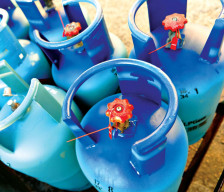
The World Bank has asked the government of Pakistan to increase the tariff for gas consumers in order to recover the entire production cost and do away with cross-subsidy that shifts burden of a consumer to another one.
The suggestion came from a World Bank mission, currently on a visit to Pakistan, during a meeting with government functionaries.
Sources familiar with the development told The Express Tribune that government officials emphasised during the meeting that a gas tariff rationalisation plan was already under way in line with a commitment given to the International Monetary Fund (IMF).
“The World Bank wants full recovery of the cost of domestic as well as imported gas including liquefied natural gas (LNG), which should be reflected in consumer bills,” a source said.
At present, consumers are paying varying prices and a uniform tariff may be put in place if the government removes the cross-subsidy – a case in point is that of textile and fertiliser sectors in which the former bears the subsidy being enjoyed by the latter.

Petroleum and Natural Resources Minister Shahid Khaqan Abbasi has already announced that the government would raise gas tariff for all consumers except for domestic users from January 2014.
The previous PPP-led government had tried to slash cross-subsidy and imposed gas infrastructure development cess to raise funds for gas import projects like Iran-Pakistan pipeline. It collected cess worth Rs47 billion from the consumers before courts declared it illegal. Now, the government has filed a petition in the Supreme Court to contest the judgment.
The PPP government also strived to end cross-subsidy and wanted to allocate subsidy in the budget, but the plan did not go through in the face of opposition from the finance ministry.
Some government officials insist that cross-subsidy should be abolished as the sectors bearing the burden are agitating against the policy. They point out that high cost of production and an extra cost of paying the cross-subsidy are making their products uncompetitive in the international market.
Under the cross-subsidy mechanism, gas consumers in power, industrial, compressed natural gas (CNG) and commercial sectors pick up the cost of subsidy for fertiliser and domestic consumers.
According to estimates, cross-subsidy worth Rs35.3 billion is doled out every year including Rs11.14 billion to the fertiliser industry and Rs23.04 billion to residential consumers.
The All Pakistan CNG Association has been protesting against high tariff rates compared to other consumers. Textile industry also claims that the government is giving a 12.5% cross-subsidy to fertiliser manufacturers, which should be done away with.
Textile millers are pressing for a level-playing field for doing business in Pakistan and are of the view that the withdrawal of cross-subsidy would facilitate the industry.
Published in The Express Tribune, December 18th, 2013.
Like Business on Facebook, follow @TribuneBiz on Twitter to stay informed and join in the conversation.



































1713853507-0/MalalaHilary-(2)1713853507-0-270x192.webp)








COMMENTS
Comments are moderated and generally will be posted if they are on-topic and not abusive.
For more information, please see our Comments FAQ